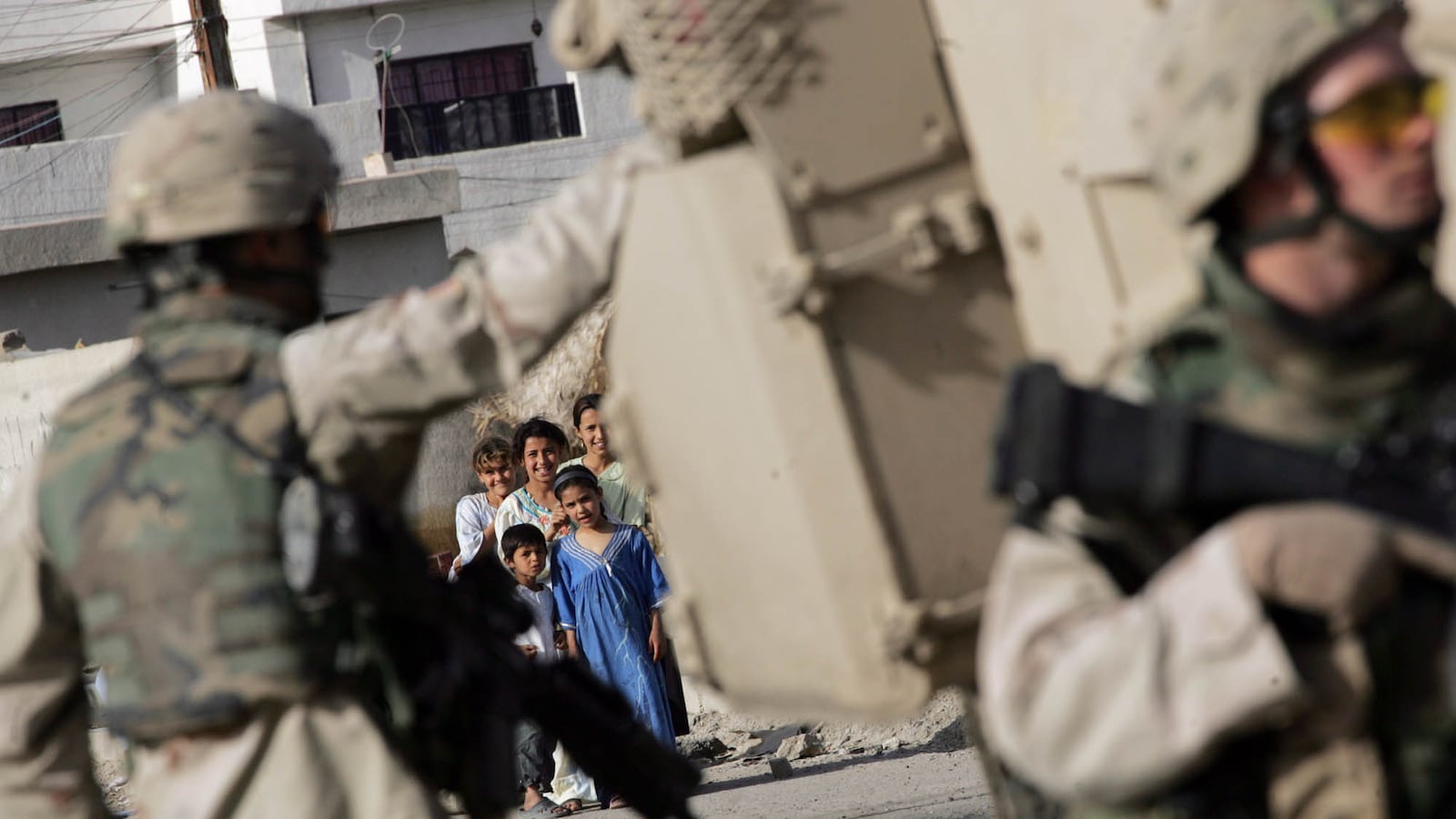“Our nation enters this conflict reluctantly, yet our purpose is sure.”
—President George W. Bush, March 19, 2003

Today marks the 10-year anniversary of our second invasion of Iraq, and the questions that were never answered about our nearly nine-year occupation are no longer being asked. Americans, our allies, and the Iraqi people are still owed an honest answer from the leaders who created the war and kept us in it: why were we there?
Hundreds of thousands of Americans protested at the start of the war, but bombing inevitably began on March 19, 2003. The next day U.S. and British forces drove through a breach in the high berm dividing Kuwait from Iraq. I entered as part of the invasion force sent to disarm Iraq. Colin Powell told the U.N. that Saddam had weapons of mass destruction and was linked to 9/11. Rumsfeld said we would be done within a few months at a cost of around $50 billion. Paul Wolfowitz said Iraq could pay for its own reconstruction with oil revenue. Dick Cheney said we would be greeted as liberators. President Bush declared an end to major combat operations 44 days later under a banner that read “Mission Accomplished.” We were not briefed on a post-hostilities plan, and even Saddam Hussein managed to evade capture for another seven months.

Iraq was to be made a democracy, by force, but I quickly felt our ideological irrelevance. Saddam’s state fell apart into tribal factions, religious sects, and ethnic divisions under our cosmetic stewardship. The country murdered and looted itself as we watched, hopelessly ignorant of causality and cure. We spent the early years telling Iraqis who they couldn’t be but never deeply sought an understanding of who they already were. A strange symbiotic bond formed between us; their increasing dependency on our resources justifying our continued occupation. The State Department was largely restrained, leaving our military under the control of political appointees like Paul Bremer, who dictated policy by decree in a series of missteps without any comprehension of consequence. It was he who disbanded the Iraqi Army, flooding the country with unemployed militants, and it was under his rule that all former Baath Party members were banned from ever holding government posts again, decapitating Iraq of its only experienced managers. Our military, in turn, divided into sects of its own, the initiatives of regional commanders entirely dependent upon their personalities and situations. Iraq was reinvented all the way back to where it had been before our invasion, only with dysfunctional corruption installed where functional corruption had been.
This war, which was never even a declared war, went on for 4,101 days, sent more than 1 million U.S. service members into the desert, left 31,926 troops wounded, and brought 4,409 of them back in flag draped coffins. The cost ballooned into an incalculable sum over a trillion dollars, a considerable amount of it impossible even to account for. The money was borrowed, and what we haven’t printed is still owed with interest. There has been no political contrition for the war’s false necessity, myopic approach, or inept management. We kept context out of the discussion, refused to exert wisdom over rhetoric, stripped the conflict down to catchphrases, and finally just stopped talking about it.
It was Iraq that proved America had moved into a state of corporate compliance while investment banking, reckless credit, and war spending bullied us into near economic collapse. It was Iraq where this corporate no-bid model was tested with blood and treasure, our nation numbed by war profiteering, sloganeering, and flash news to the point where incredible injustice and inequity were allowed to exist in plain sight. Our addiction to damage went passive and we watched, shaking our heads at tragedy but content that what troubled us kept its distance from our personal lives.

We withdrew from Vietnam largely due to domestic protest. We withdrew finally from Iraq because America just got bored with it, the repetition of bad news lulling us to sleep, our voting public unable to sustain their attention on depressing information. By 2005 when I returned for my second combat tour, the reason for our invasion had already been disproven, the cost greatly exceeding any estimates, our presence already beyond official predictions, and Iraq in chaos. I went back to help get us out. I didn’t know we weren’t leaving.
I remember crossing an open space in the southern part of Ramadi, one or two of us at a time, running. As I got near the middle of the clearing, a bullet snapped in front of me, just passed my face out in the air I was about to run through. A sniper was aiming for my head and led me too far. No second shot was fired. When I reached the other side, a Marine who had been running behind me smiled and nodded, as if we had won a prize. I would have been hit in the head, dropped in a pile in the middle of the road. My team would have dragged me out and guarded my body until the medevac arrived to carry me to the morgue. They would have looked down at me trying to believe that I was not alive, that it had been so quick, that there was nothing they could do but stand there with my death, my killer walking free. In our quarters that night they would have gone through my things to figure out what to send home to my wife and baby. Then they would have slept, awakened, dressed in their gear, and headed out on patrol again. Our position was untenable, our mission insensible, and my commanding officer would have to write a letter explaining what I had given my life for. Nothing would have changed except that I would be gone. I have looked down on dead Marines this way, trying to disbelieve them back to life.
The fallen are just numbers to America now, each one somewhere in Four Thousand Four Hundred Nine, the sum indivisible from its parts. But we are one nation, indivisible. How did so many of us fail so few of us? Where did Americans draw that line, making us divisible into the million who went to Iraq and the more than 200 million voters who slowly realized there was no reason to send us, knowing they always had the power to bring us home? President Bush was awarded a second term in 2004 over Senator Kerry’s campaign opposition to the Iraq War.
There were no battlefields, no strategic targets. The war was defined by casualties, mistakes, and the names of cities we had never heard of: Fallujah, Nasiriyah, Ramadi, Mosul, Haditha, Kirkuk. It was fought by a nation and military unprepared to handle nuance, pronouncing the beginning with “shock and awe” and declaring its end with “extraordinary achievement.” We spent our way out, replacing troops with expensive contractors. They are still there, more than 20,000 of them, and we are still borrowing to pay for them while cutting our school budgets.
Last year I drove through 48 of our United States, and I saw a poor country. It was not Iraq that brought us to this, but Iraq bled us when we had little blood to give and exposed a national acceptance of fate. In Custer County, Idaho, there was a sign by the road that said. “What you can tolerate you will not change.”
It has been a decade since I packed for the war we tolerated.
What have we learned?






